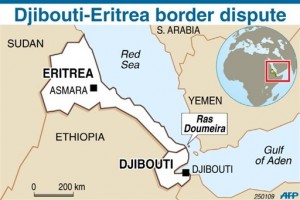Eritrea Releases 4 Djiboutian Prisoners of War After 8 Years of Incarceration
 The African Union (AU) on Monday praised Eritrea’s decision to release of four Djiboutian prisoners of war who had been imprisoned since 2008 after a three-day border conflict between the two countries. The Djiboutian soldiers were set free on March 18.
The African Union (AU) on Monday praised Eritrea’s decision to release of four Djiboutian prisoners of war who had been imprisoned since 2008 after a three-day border conflict between the two countries. The Djiboutian soldiers were set free on March 18.
AU Commission Chairwoman Nkosazana Dlamini-Zuma said the decision to release the prisoners was an indication of improving relations between Djibouti and Eritrea.
Qatar reportedly negotiated for the release of the four Djiboutian soldiers, who were being held incommunicado.
Last week, after their release, the soldiers were flown back home via Qatar Airways. Qatar’s Foreign Minister Sheikh Mohammed bin Abdurrahman al-Thani reportedly accompanied the soldiers on the flight from Asmara.
Territorial disputes, which date as far back the 1900s, led to the three-day conflict between Eritrea and Djibouti in 2008. The disputed areas include maritime boundaries and the Doumeira Islands in the Red Sea. Both nations have engaged in conflicts in 1996 and 1999 over the
same issue.
According to reports, the conflict in June 2008 left twelve Djiboutian soldiers dead.
Eritrea allegedly captured 19 Djiboutian soldiers during the war. However, according to Djibouti’s Ambassador to the U.S. Mohamed Siad Doualeh, some soldiers escaped.
The number of causalities Eritrea sustained in the conflict has still not been disclosed.
Doualeh said the release of the Djiboutian prisoners-of-war is an indication of a change in the relations between Djibouti and Eritrea.
“We are hoping and praying. We don’t want to prejudge what the future has, but I think this signals a change,” he said.
Asmara’s Ambassador to the U.S. Girma Asmerom said Asmara is committed to regional peace and stability. He stressed that Eritrea was willing to work with Djibouti, as cooperation is the only option.
“There is no option B,” Asmerom said. “There will be peace and stability in the whole region and Eritrea’s vision is there should be regional integration, there should be free movement of people, there should be free movement of goods, so Eritrea from day one has been committed to regional peace and stability.”
Eritrea Releases 4 Djiboutian Prisoners of War After 8 Years of Incarceration
The African Union (AU) on Monday praised Eritrea’s decision to release of four Djiboutian prisoners of war who had been imprisoned since 2008 after a three-day border conflict between the two countries. The Djiboutian soldiers were set free on March 18.
AU Commission Chairwoman Nkosazana Dlamini-Zuma said the decision to release the prisoners was an indication of improving relations between Djibouti and Eritrea.
Qatar reportedly negotiated for the release of the four Djiboutian soldiers, who were being held incommunicado.
Last week, after their release, the soldiers were flown back home via Qatar Airways. Qatar’s Foreign Minister Sheikh Mohammed bin Abdurrahman al-Thani reportedly accompanied the soldiers on the flight from Asmara.
Territorial disputes, which date as far back the 1900s, led to the three-day conflict between Eritrea and Djibouti in 2008. The disputed areas include maritime boundaries and the Doumeira Islands in the Red Sea. Both nations have engaged in conflicts in 1996 and 1999 over the
same issue.
According to reports, the conflict in June 2008 left twelve Djiboutian soldiers dead.
Eritrea allegedly captured 19 Djiboutian soldiers during the war. However, according to Djibouti’s Ambassador to the U.S. Mohamed Siad Doualeh, some soldiers escaped.
The number of causalities Eritrea sustained in the conflict has still not been disclosed.
Doualeh said the release of the Djiboutian prisoners-of-war is an indication of a change in the relations between Djibouti and Eritrea.
“We are hoping and praying. We don’t want to prejudge what the future has, but I think this signals a change,” he said.
Asmara’s Ambassador to the U.S. Girma Asmerom said Asmara is committed to regional peace and stability. He stressed that Eritrea was willing to work with Djibouti, as cooperation is the only option.
“There is no option B,” Asmerom said. “There will be peace and stability in the whole region and Eritrea’s vision is there should be regional integration, there should be free movement of people, there should be free movement of goods, so Eritrea from day one has been committed to regional peace and stability.”
Photo: AFP